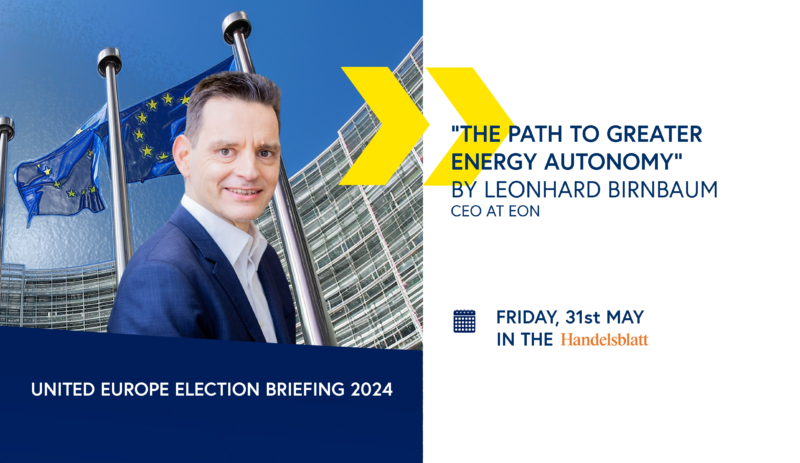Leonhard Birnbaum urges European governments to promptly implement the new provisions for the EU electricity market. This would enable long-term economic planning. Additionally, he calls for more pragmatism in international trade agreements.
“THE PATH TO GREATER ENERGY AUTONOMY”
After the Russian war of aggression against Ukraine and increasing tensions in the Middle East, the energy transition has become even more of a geopolitical instrument and a security issue than it already was. For us in Europe, this means that energy supply is a European issue, and it belongs at the top of the agenda.
The EU needs to expand and further digitalize its power grids
The energy crisis has shown that renewable energies and energy efficiency play an important role in increasing energy security because they gradually reduce dependence on imported fossil fuels. For a rapid transition, cost-effective investments, bureaucracy reduction, and coordinated management are necessary. At the same time, the expansion and further digitalization of power grids are crucial to maintain the pace of renewable energy expansion in the European Union (EU). In the building sector, the pressure to act is particularly high, as fossil gas and oil still account for a large share of heating in residential buildings in Germany. Therefore, the expansion of the use of heat pumps, a highly efficient, electricity-based heating technology, is an important measure. A robust electricity market design is not only key to the success of the energy transition but also the foundation for supply security and affordable prices across the entire EU energy internal market. Therefore, the German and all national governments should quickly implement the new provisions introduced with the recent reform of the EU electricity market to create long-term planning security and unlock the necessary investments.
The EU must urgently seek new suppliers for LNG and hydrogen
At the same time, we need capacity mechanism to support the energy system. Through a capacity market, generation capacities get a price and become tradable. This allows the appropriate generation capacities get a price and become tradable. This allows the appropriate generation capacities with the suitable characteristics to be made available at the right place as needed. The same should apply to storage and controllable consumers who shift (part of) the load to set times. Therefore, we must address load management through a renewed capacity market that particularly also offers incentives for storage and flexible consumption. Given the phase-out of nuclear energy and coal-fired power generation, new suppliers for liquefied natural gas (LNG) and increasingly for hydrogen must be found for the energy system in the short term. Our former dependence, especially on the Nord Stream pipelines, should serve as a warning when looking for non-Russian suppliers. We should not rely on single import routes and secure contractual flexibility to avoid “stranded assets” and the risks of dependence on one supplier. Autonomy must not be confused with autarky. Additionally, a secure supply of raw materials for the energy transition and the functioning of our internal market is becoming increasingly important. Therefore, it is essential to establish bilateral raw material partnerships with selected countries at the EU level that ensure sustainability minimum standards (ESG). In this regard, Europe must show much more pragmatism. It was a big mistake to let the Transatlantic Trade and Investment Partnership (TTIP) fail over the “chlorine chicken”. Instead of learning from this, now even the EU-Canada Agreement (CETA) and the EU agreement with the Mercorsur states are at risk of failing on issues that are ultimately materially irrelevant for Europe.
Germany, in particular, must use its European political weight to prevent national solo efforts, so that a genuine “Team Europe” works together in the search for international strategic partnerships. – Leonhard Birnbaum
Finally, a note on the external dimension of the European Union. The EU and its member states should continue to invest globally in energy partnerships with third countries and pursue an even more systematic and coordinated approach. Germany, in particular, must use its European political weight to prevent national solo efforts so that a genuine “Team Europe” works together in the search for international strategic partnerships, also ini the immediate interest of Germany’s neighboring countries. Overall, it becomes clear that energy security is a complex and multifaceted system. Only through a coordinated and strategic approach at the European level, will we be able to effectively respond to the challenges of the energy transition.
The Author: Leonhard Birnbaum is CEO at EON.



